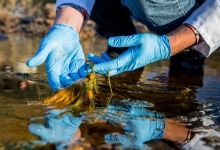Wetland restoration
CSIR competences in water management include specialised knowledge and expertise in wetland restoration. Wetlands are South Africa’s most valuable ecological infrastructure. Expertise in wetland restoration is rooted in biology, ecology, ecotoxicology, limnology and ecosystem mapping. The CSIR also has sound skills in environmental management, environmental chemistry, geohydrology, bio-remediation and wastewater treatment.
South Africa’s wetlands are ecosystems that support water resources; they purify water and regulate flows and also store and release water slowly, thereby filtering pollutants and reducing the impacts of droughts and floods. They also contribute to the recharge of underground water resources. Wetlands have a rich diversity of fauna and flora and support the socio-economic activities of many rural communities by providing food, fuel and cultural values. They are, however, one of the country’s most threatened ecosystems and studies have shown that 35-60% of wetlands have been severely degraded or have been lost due to anthropogenic activities, making wetland restoration of key importance.
In South Africa, wetlands are often found above rich coal deposits and many occur in areas that are currently being mined. Research in the upper Olifants River catchment, where coal mining takes place, has shown that wetlands can play an important role in mitigating impacts of polluted water that enters the catchment.



